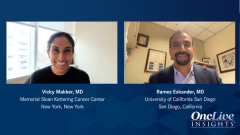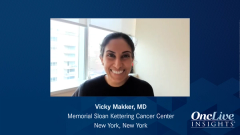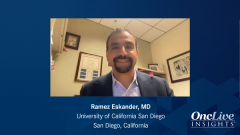
Ongoing Clinical Trials for Patients With Endometrial Cancer: Looking Toward the Future
Experts highlight key ongoing trials and emerging therapies for patients with endometrial cancer.
Episodes in this series

Transcript:
Ramez Eskander, MD: I don’t think there’s a better way to end this than to talk a little about what the future might bring. I know that you and your team have been incredibly active in leading the clinical trial space and continuing to evolve the care for patients with endometrial cancer. There are a slew of clinical trials right now that are asking questions relevant to the care of patients with endometrial cancer. I’ll ask for you to comment on 2 things because we could spend an hour just on this. If we were to talk about this premise of chemotherapy plus IO [immuno-oncology therapy] in the front line, how do you think that might evolve and/or impact treatment patterns? Then secondly, this opportunity for incorporation I call it, we’re in a maintenance world, we talked about maintenance therapy. There’s the selinexor trial, which recently had a press release suggesting that it met its primary end points, which was exciting for us and for our patients. Can we focus on those 2 things; frontline chemotherapy plus IO and then this premise of maintenance therapy and where you think the field may go in the next year or two?
Vicky Makker, MD: That’s really the question of the hour, and I think this is the thing that’s on our minds because it also impacts the way that we think about clinical trial development post the IO exposure. Because I think we all believe that a standard of care shift is very much coming. So I think there are a lot of preclinical data that support the utility of chemotherapy plus immunotherapy, not only in the patients with mismatch repair deficiency, but also in general for the proficient patients as well. I think honestly that we’re going to need to see what the degree of benefit is for all-comers. Are we going to have a situation where there is benefit across the spectrum whether they’re proficient or deficient, or is it going to segregate and you’re going to see the biggest benefit in the deficient patients and less so in the proficient patients? That would then open up the space for maintenance therapy, especially in those higher-risk populations. I think there are a number of ongoing trials looking at chemotherapy plus pembrolizumab, atezolizumab, dostarlimab, plus or minus PARP inhibitors.
Absolutely, we’re going to very rapidly refine the management of upfront endometrial cancers. I think it’s premature at this time to be able to say with great certainty whether it’s going to be specific subsets or across the board. I do think that there is a cohort of patients who for myriad reasons may not be able to do checkpoint inhibitor therapy in combination with chemotherapy. So I think in a cohort of patients there will be the potential for maintenance therapies like selinexor and others that are being developed. I think that given the KEYNOTE-775 results in the patient population with recurrent, previously treated endometrial cancer, we’ll have to see what happens with LEAP-001, which is bringing that combination to the frontline setting.
I think we can be certain of one thing, which is that the paradigm is about to have a seismic shift. I think beyond that, it’s really hard to know which subsets are going to derive the greatest benefit. I think we’ll have to be very thoughtful to make sure that we’re treating the right cohort of patients with the right regimens. And just like the tumor is very heterogeneous, likely the treatments are going to be also subdivided based on really what we see in terms of treatment effect. [There are a lot] of exciting data that are going to come out in the next couple of years. It’s very exciting times.
Ramez Eskander, MD: I could not agree more. I also honestly couldn’t think of a better person to spend this hour with talking about endometrial cancer. Thank you, Dr Makker. This has been an unbelievable conversation. There is a lot to learn. It’s an evolving space as was mentioned. I hope that we can have a follow-up conversation in the not-too-distant future to talk about those things.
Vicky Makker, MD: It would be my distinct privilege.
Ramez Eskander, MD: I want to thank the audience for joining us, and I hope you found this program informative and helpful. Thank you all.
Vicky Makker, MD: Thank you everyone.
Transcript edited for clarity.









































